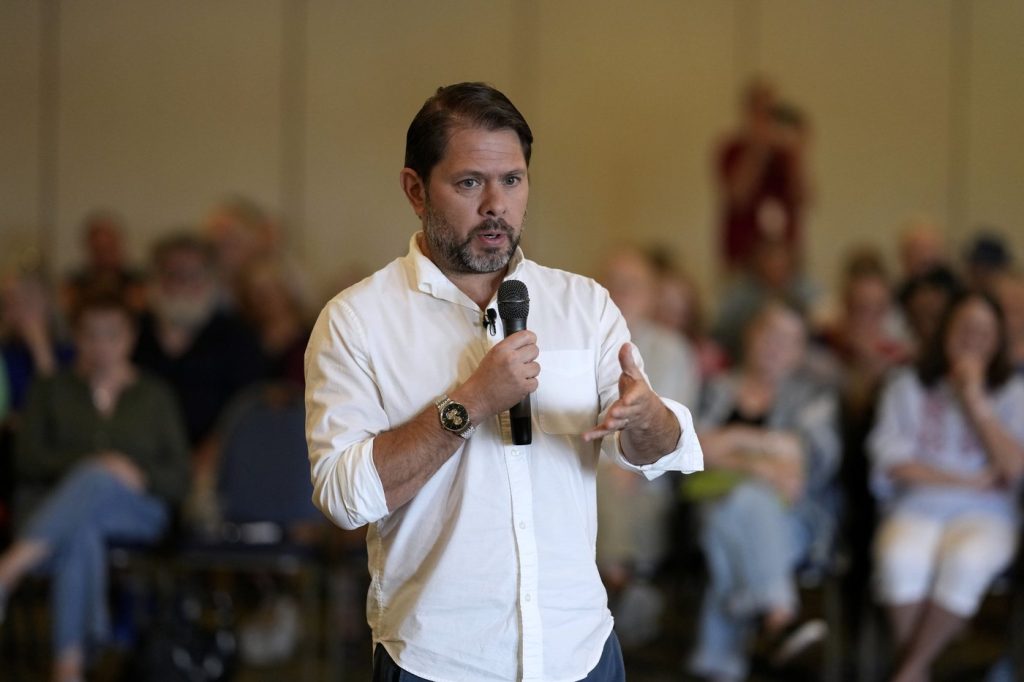DAVENPORT, Iowa (AP) – More than 300 attendees gathered at a town hall meeting in Davenport, Iowa, on Saturday, where Senator Ruben Gallego, a first-term Democrat from Arizona, rallied enthusiastic support by criticizing the Republican-backed tax bill signed by President Donald Trump. Gallego claimed the legislation was likely to make "America poorer and sicker," sparking applause and cheers throughout the two-hour event.
In stark contrast to the negative reception experienced by Nebraska Republican Representative Mike Flood during his town hall earlier in the week, Gallego's appearance energized the crowd. Flood faced jeers and opposition for promoting the same tax legislation, which has drawn significant criticism from Democrats and many voters. This marked a notable shift for Democrats, who have been striving to regain momentum after losing the previous election, particularly in their opposition to Trump’s agenda.
Many attendees, like Pete Wernimont from Waterloo, expressed their concerns about the potential impacts of the tax bill. Wernimont noted a growing clarity among Democrats about what the proposed measures could mean for average Americans, emphasizing the imperative of standing united in the coming year as midterm elections approach. Others echoed these sentiments, highlighting the adverse consequences for healthcare and the middle class under the new tax plan.
The town hall was part of a broader Democratic strategy to highlight the political ramifications of Trump's tax legislation, which is seen as politically risky for Republicans facing tight races in Congress. The bill, which was passed without any Democratic support, includes substantial cuts to health care programs, particularly Medicaid, by imposing new work requirements for many beneficiaries. This has raised concerns among healthcare professionals and advocates who fear a deterioration of essential services for low-income Americans.
Gallego's event in Davenport successfully contrasted with Flood's town hall in Lincoln, Nebraska, which attracted a crowd of 700 that vocally opposed the Republican tax bill. Alexandra Salter, a physician's assistant from Davenport at Gallego's event, emphasized her reasoning for attending, pointing out that the tax bill threatens healthcare services. Her sentiments were echoed by other attendees, illustrating a rising discontent among constituents regarding Republican policies.
As Democrats rally around the implications of the tax legislation, they have initiated high-profile appearances in Republican-held districts to raise awareness and mobilize support against these measures. For instance, Alexandria Ocasio-Cortez, a prominent Democrat from New York, has visited various Republican districts to advocate against the tax bill and highlight its ramifications on Medicaid. Similarly, Vermont Senator Bernie Sanders is planning rallies in North Carolina's Republican-held districts specifically addressing Medicaid cuts and their effects.
Polling data indicates an uphill battle for Republicans, as approximately two-thirds of U.S. adults believe the new tax law primarily benefits the wealthy. Additionally, about 60% perceive it as potentially harmful to low-income populations. In this context, Gallego's focus on the implications of the tax bill serves as a rallying call for Democrats, reinforcing their identity as defenders of the middle and working classes in America.
With ongoing strategic town hall meetings and public engagements, Democrats aim to galvanize their base and exploit any political advantages presented by the contentious tax legislation ahead of the 2026 elections. Gallego's efforts in Iowa not only strengthen his profile within the party but also contribute to the broader Democratic goal of reclaiming momentum in regions that have historically been competitive.











